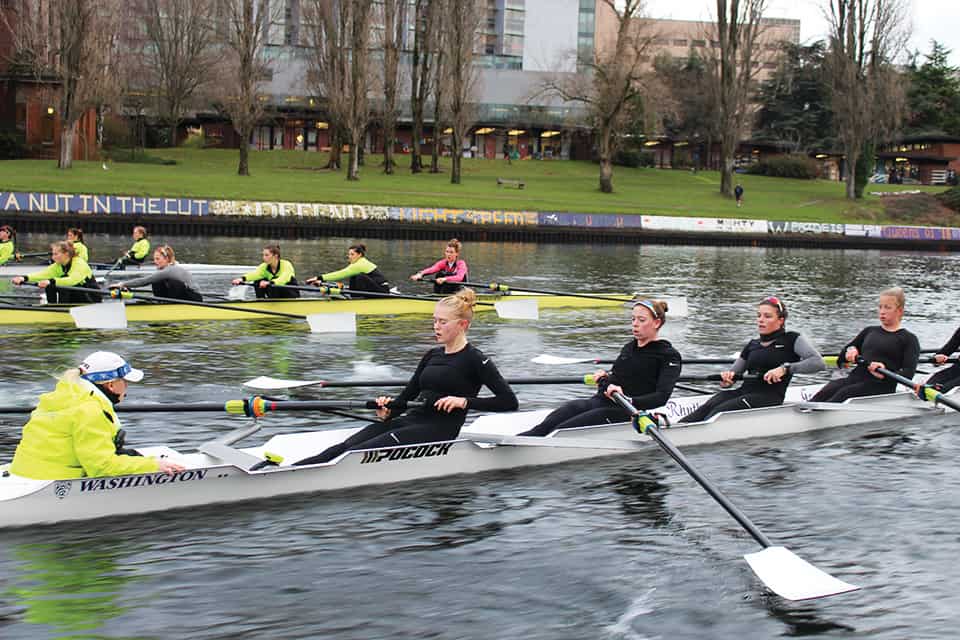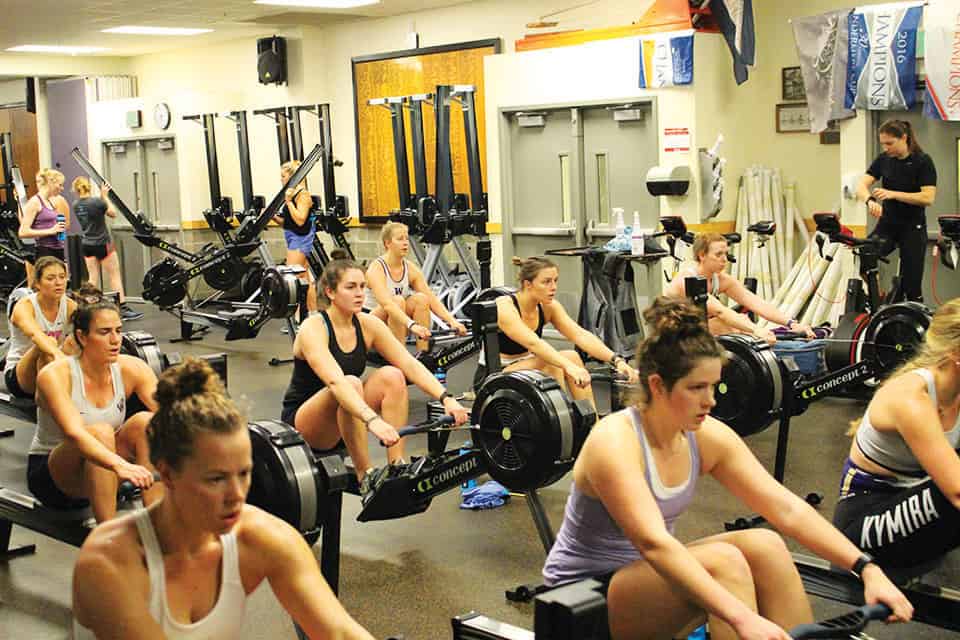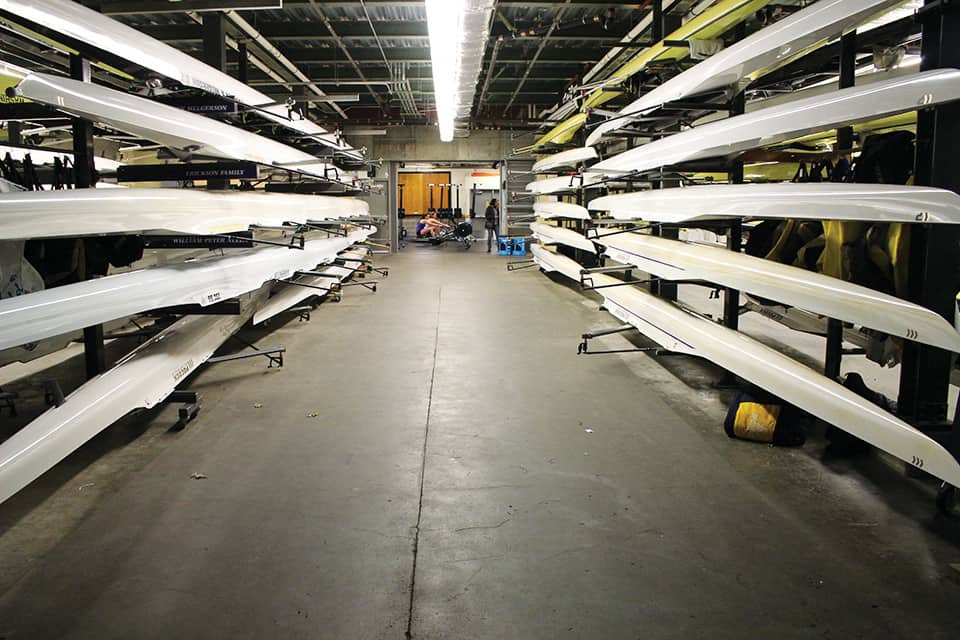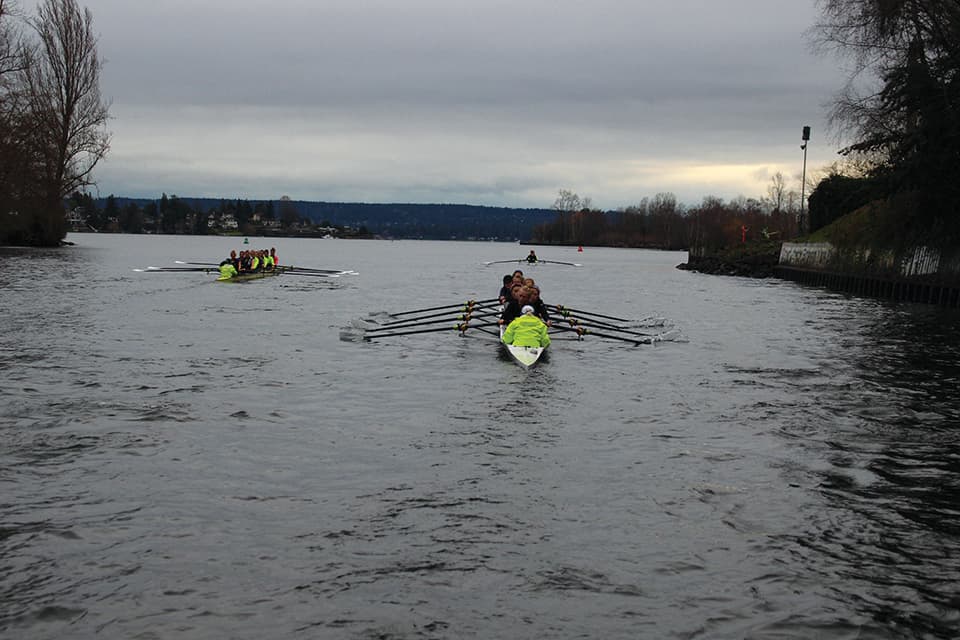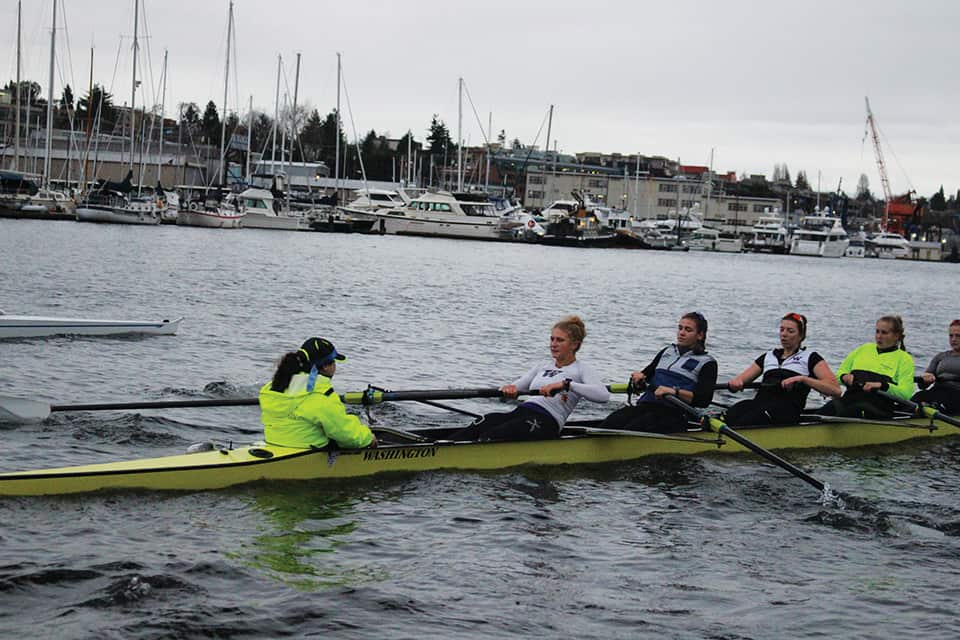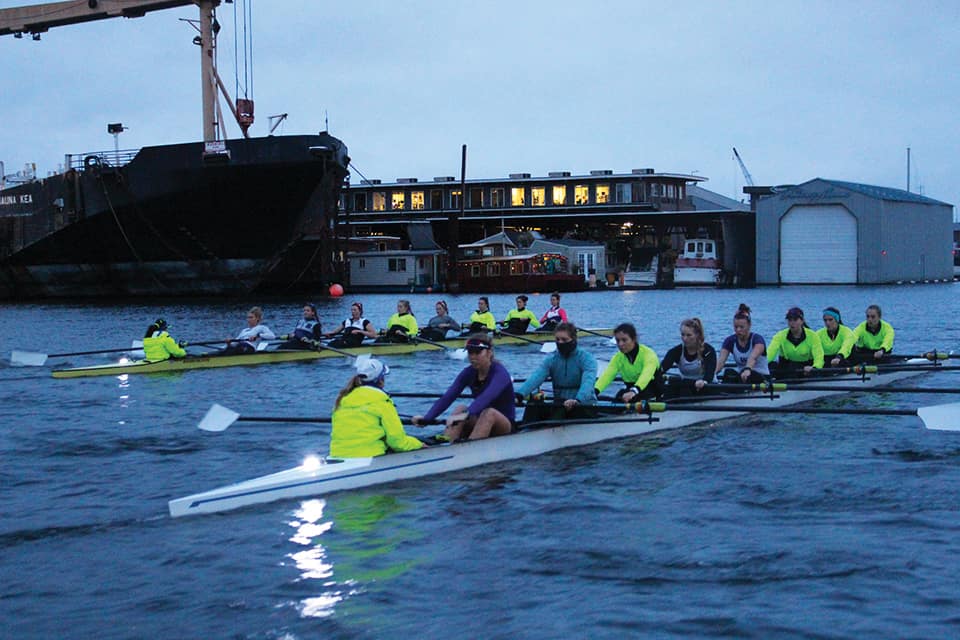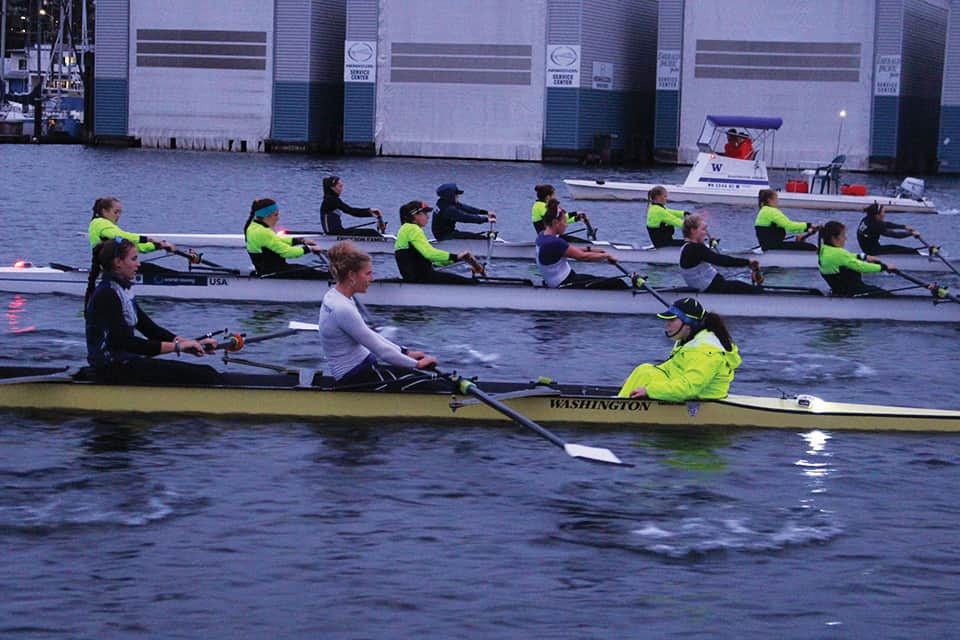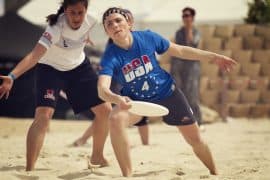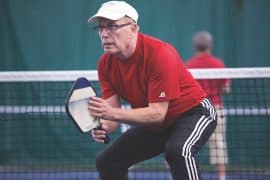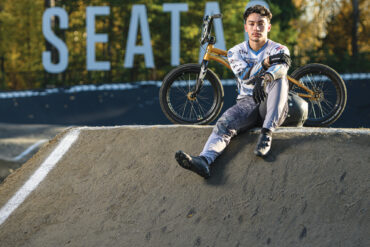The Girls in the Boat: The University of Washington’s Women’s Rowing Team
written and photographed by Kevin Max
A collective breath wafted up to the wooden rafters of Conibear Shellhouse, a soft cadence of repeated hushes exhaled into the space. Hshh … Hshh … Hshh. In unison, forty women with their eyes steady on an imaginary horizon, another championship, pulled back on the handles of rowing machines, pushing through their legs and exhaling with the machine’s pneumatic coil—Hshh—the entire gym one large organism whose whispers recalled a tradition tracing back far before the 1936 Olympics.
In 2013, the New York Times bestseller The Boys in the Boat by Daniel James Brown took millions of readers to a time when America struggled under the weight of the Great Depression and had just begun to turn its attention to the rising wave of fascism under Hitler’s Germany. Coming from relative poverty and obscurity, the boys of the University of Washington’s rowing team would beat the elites of sport and the Swastika-clad Aryan crew in Berlin in 1936. These lads, their colorful mentor Al Ulbrickson and shell-maker George Pocock embodied American innovation and optimism as they raced their way into rowing lore.
University of Washington women’s rowing team looks to repeat history in another NCAA sweep
Now comes the UW women’s rowing team—girls in the boat.
On May 28 last year, University of Washington’s women swept all three events—the first and second varsity eights and the four—making it the first team to win all grand finals in the twenty-one-year history of the NCAA Regatta.
History was teetering when the eight rowers plus coxswain from the University of Washington stepped into their racing shell at Mercer Lake in West Windsor, New Jersey, the home course of Princeton University. The clouds they were used to, as the UW rowers live and train in Seattle where rain is a constant element of any outdoor pursuit.
To their left was their perennial rival, Cal, whom UW had overpowered in the Pac-12 championships two weeks prior. Cal’s coach, Al Acosta, had coached with UW coach Yasmin “Yaz” Farooq at Stanford. To the right was Stanford, the sixth-seed boat, whose strengths Yaz knew well, having recruited all of them.
While Cal has always gunned for UW, the Stanford crew had a personal reason to take it to the UW boat with revenge in mind. The last time Stanford had won an NCAA championship was in 2009, with Yaz as coach. The Huskies’ varsity eight boat gobsmacked Stanford in the Pac-12 championships, putting eight seconds into its rivals. This fire burned for the Stanford women.
As the flag dropped, the Washington women pulled to an early lead and maintained it into the final 500 meters of the 2,000-meter race. Stanford made up time in the second half of the race, taking back one second of the UW’s two-second margin. It would not be good enough to pass the determined finish by Washington, who crossed the line and shattered records.
“I remember smiling at that point,” Yaz recalled. “It was strangely perfect. I knew what every woman in both of those boats was capable of doing. Stanford put in a worthy challenge. Washington answered it. Every woman in both of those boats put it all out there. At the end, Phoebe Marks-Nicholes called over, ‘Helluva race, Stanford!’ and it truly was.”
University of Washington women’s rowing team: champions in the making
On a frigid morning this January, UW women’s crew paddled out from the Conibear Shellhouse. Into the dark water, twenty-four blades dipped soundlessly just below the surface, settling there for a moment in a solution of both resistance and propellant. It’s then that two dozen women in three boats of eight transferred an avalanche of power from a coordinated grouping of quads and hamstrings, glutes, lats, traps and delts evenly down the length of 12-foot, 4-inch oars, shooting the 55-foot carbon arrow past houseboats, yachts and tankers and into the urban slate of Lake Union.
“Try to keep that outside wrist flatter so you can squeeze off that finish better,” Yaz shouted into a bullhorn that blared across the bows of the three shells and into the early morning grey. Her petite features peeked out from a sou’wester rain hat in the coach boat. Her Os paired with a soft Scandinavian W and projected the authority of an experienced cox.
Yaz grew up in a suburb of Minneapolis before leaving for the University of Wisconsin, where she coxed for the varsity eight. She went on to the 1992 and 1996 Olympics, with sixth and fourth place finishes. In the World Rowing Championships between 1990 and 1995, she earned a gold and three silver medals in venues such as Finland, Tasmania, the Czech Republic and Indianapolis.
Of all of her races, one against Romania in the 1995 World Cup stands out. The Germans were the favored team. The Americans would be in contention. The Romanians were always a force. The American team pulled out to a boat-length lead going into the final 500 meters. Romania attacked from fifth place and pulled within a half-boat of the Americans going into the final 250 meters. Yaz looked to her left and saw the Romanians making a late run. The American women dug deeper, kept their form and edged the charging Romanian boat for a gold. “That just felt so good,” she said of the United States’ two-second victory over the Romanian eight.
“Keep accelerating the blade with your leg drive,” Yaz cracked over the bullhorn as a paddling of ducks on Lake Union roused from their neck-tucked slumber. “I think your swing is aggressive and that’s fine, but you’re swinging instead of using your legs all the way. Let your legs build that speed, because they’re bigger and stronger.”
University of Washington women’s rowing team: from athlete to coach
In 2006, Yaz was living in Eugene, Oregon, and leading a small rowing club when she got a call from Stanford. With no high-level coaching experience, the two-time Olympian wasn’t sure she was qualified for the job. “You never know if being an athlete translates into being a good coach,” she said. Even now, she struggles to name the few elite coaches who came from coxing. Nonetheless, the sprite of a woman accepted the coaching position and led the program to a second-place finish in her second year. Stanford hadn’t been among the top three finishers in its history. In her third year, however, Yaz and her team won the NCAA championship. Gone was the doubt that a cox could steer one boat, but not a whole team. Her coaching career was on fire.
Over the course of her ten-year tenure at Stanford, the coxswain-turned-coach would lead the Cardinal women’s rowing team to its best run in its history. When she first took the Stanford coaching job in 2006, her husband asked if there was any other coaching job that would entice her to leave Stanford. Washington, she replied.
In 2016, UW called.
The resignation letter from the Stanford Athletics Department showered her with praise. It would miss the coach who took the program from obscurity to spotlight. Perhaps more troubling for Stanford was that she’d be the coach of its Pac-12 arch rival. “She has invested a great deal into the program and built Stanford into a perennial title contender,” the athletic department wrote. “An Olympian and United States team captain herself, Yaz knows what it takes to compete and lead on the sport’s biggest stage.”
In her first year at University of Washington, Yaz would have the daunting task of measuring up to the performance of long-time departing coach, Bob Ernst. She changed how the team trained with more on-water volume, she shuffled boat assignments and brought order to a fractious team, which had dismissed its coach in a controversial mid-season ruckus.
“There are a lot of ways to go fast,” Yaz noted. “The training that I did on the national-team level involved doing more aerobic base training and volume. That’s what I implemented for them. They had a history of starting fast, but fading before the finish line. The hardest thing in the beginning was to get them to row with less intensity for longer periods of time—to build what I call ‘the capillary superhighway.’”
She became the first coach to win the NCAA championship at two schools. That performance was remarkable enough to make her the 2017 Collegiate Rowing Coaches National Coach of the Year.
A young team, all rowers from the 2017 championship team have returned for another crack. Into the water they went, the shells cutting sharply through the 45-degree morning air, three boats of eight slicing through Montlake Cut. They slid past the old boathouse where the 1936 team trained and George Pocock made his shells. In the fog around them, the ghosts of history mingled with the prospect of making history again at the NCAA rowing championships in Sarasota, Florida.
University of Washington women’s rowing team: Elise Beuke
Elise Beuke pulled steadily along, her blades slicing into the darkness of Lake Union.
Beuke, a 20-year-old sophomore, learned how to row in Sequim Bay on the northern coast of the Olympic Peninsula. Her dad, a middle school history teacher and cyclist, decided his kids would get involved in endurance sports. Beuke’s mom was already on the water, kayaking the banks of the Olympic Peninsula and the world over looking for smooth pieces of sea glass for her jewelry-making business.
To the west of the small town of Sequim lie the Olympic Mountains, to the north Victoria, British Columbia, and 70 miles to the southeast, the University of Washington. While the Olympic Peninsula sees an average of 140 inches of rain per year, Sequim and its surrounding area falls in the rain shadow of the Olympic Mountains, making it a dry, cool place for training on the water.
Beuke began rowing on a two-oared scull at Olympic Peninsula Rowing Association, a local club founded by John Halberg, a UW crew member from the 1958 class.
Halberg helped found the club in 2007 and, in 2012, recruited Brazilian cox Rodrigo Rodrigues to take over coaching at the fledgling club. “John Halberg, the president of my rowing association, bought the boat I row in for me,” Beuke said. “Without him, I wouldn’t be rowing.”
In high school, Beuke quit basketball and volleyball to focus on rowing, and she read Brown’s The Boys in the Boat. “I think it had a unique effect on me because I’m from Sequim and Joe Rantz was from Sequim,” she recalled.
On January 6, 2017, Halberg died of a heart attack while rowing. Four months later, Beuke would cross the finish line and, as a freshman, make rowing history for his alma mater. The local newspaper, the Sequim Gazette, connected Halberg’s recruit, Rodrigues, and Beuke in an article about Halberg’s legacy. “Rodrigues helped build the club’s junior program and coached the likes of Sequim’s Elise Beuke, who placed seventh at the World Junior Championships in 2015 and earned a scholarship to row at the University of Washington.”
Beginning Beuke’s sophomore year, UW brought in a new head coach. “I was excited because Yaz was an Olympian and a cox like my high school coach, Rodrigues,” she said.
Beuke began to notice the team’s training was “so much more organized and intentional,” she said. “We knew that we were doing this workout today because it was targeting these specific muscles and would help us in different parts of the race. This really helped people take ownership of
this workout.”
University of Washington women’s rowing team: strength in diversity
Among the team’s forty members are kids from Washington, California, Vermont, Virginia, England, Germany and Italy. Some have no rowing experience. Some come from European rowing elite.
Carmela Pappalardo, “Pappi,” started rowing when she was 12. Her father, Rosario Pappalardo, a competitive rower, was her coach. The youngest of six children, Pappi grew up watching her older brothers row.
She began rowing in the Tyrrhenian Sea, between mainland Salerno, Italy and Sardinia. In the shadow of the Santa Maria Asunto Church and along the steep cliffs of the Amalfi coast, Pappi focused on technique bobbing in the ocean chop. “In the sea, it was really difficult,” she said. “Sometimes it was really boring because I like rowing with other people and I was in a single.”
Competition rowing was going well, and Pappi was invited to join the Circolo Canottiere Aniene rowing club in Rome, where she was also enrolled in school. The logistics of pursuing education and rowing in Rome, she said, was hard. “My university was so far away from my club. It took me two buses and forty minutes to get there,” she said.
In 2016, she got a call from the UW rowing team. “Early on, I realized that I could go to UW and get a scholarship,” she said. “I studied English since high school and tried very hard. I came from a small town. This was a big opportunity.”
In her first year at UW, Pappi found the people friendly, felt at home (albeit a home with inferior pasta and pizza) and rowed to a first-place finish in the second varsity eights boat. “It was amazing!” she said. “We were all working together very well. Every race, I just try to do my best and stay focused from the first to last stroke.”
This season, the 22-year-old hopes to make the first varsity boat and perhaps find more authentic southern Italian food.
The team’s goals, however, will be focused on the Pac-12 championships May 13 in Gold River, California, with Stanford and Cal gunning for them. Two weeks later at the NCAA championships in Florida, the girls in the boat and their second-year coach will wrestle with the notion that they could repeat last year’s unprecedented sweep.


